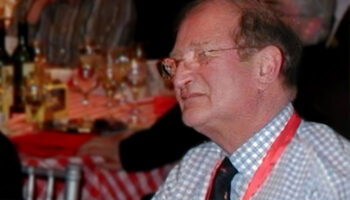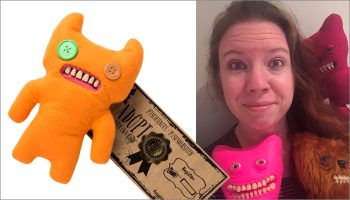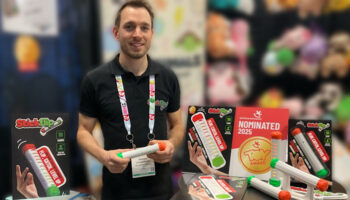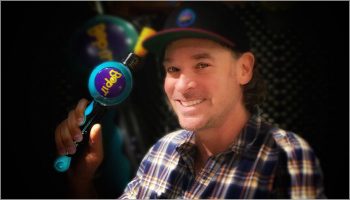Spin Master’s Ben Dermer on why the job of toy creatives is the opposite of being inventive
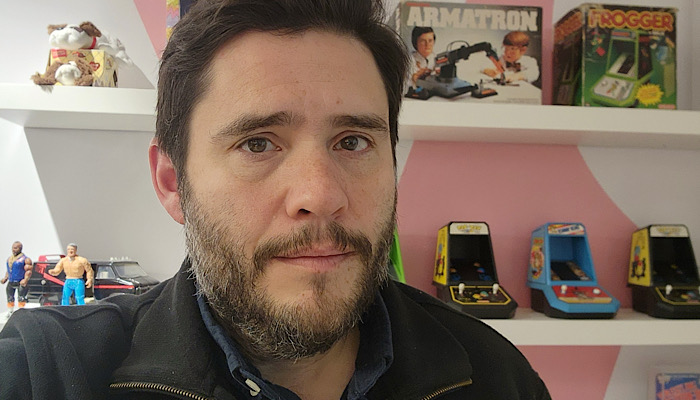
Ben Dermer, I was worried your job title was so long I wouldn’t be able to fit in the headline! It’s changed, though, has it? What is it now?
My title now is SVP of Toy Innovation. It’s changed many times over the years, but I’ve more or less stayed in the same general discipline.
Okay! Senior Vice President of Toy Innovation at Spin Master… And on a day-to-day basis, what do you do?
On a day-to-day basis, I work with inventors, developers, creatives and designers, both inside the company and outside, to help discover new toy ideas and take them through the development process to become new products.
Not all on your own, I trust?
Oh no, not at all! I work with a very talented team of creative developers and spend a lot of time engaged with the inventors – many of whom I count among my very good friends. More generally, my job is to make sure Spin Master has a pipeline of new product innovation to satisfy the business needs of the company, and to help bring that innovation through preliminary development and into the line.
Great answer! And how did you get into the industry, Ben?
Like many, I didn’t get into the toy industry deliberately. I have a background in film studies, but following my undergrad, I took a job during what was mean to be a part time hiatus before grad school, and that job wound up evolving into very fun career. At the time, my good friend Matt Wexler, now a prolific TV producer, was working at Spin Master. It was he who recommended me for a junior position, so I have him to thank.
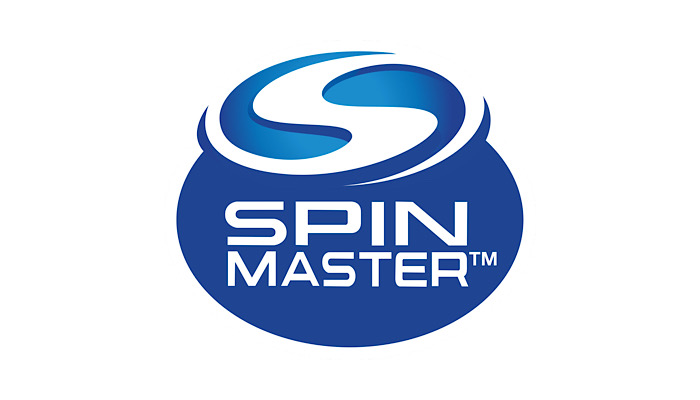
When people stumble into the industry, I’m always curious to ask this… If you hadn’t got into toys and games, what do you think you would’ve ended up doing?!
My intention was to go into creative storytelling, either in film or musical theatre…
Film and musical theatre?
Whether or not I’d have succeeded is another question! Film is a very tough business. I think I would’ve fared better with song writing… I still spend a fair amount of time invested in that, as a semi-professional hobby… I’m pretty good with meter and rhyme.
That’s fascinating… I’m one of the most unmusical people you could ever meet so, to me, what you do there would be almost like magic. So, now… You won’t necessarily know this, Ben, but you’ve been described as “An unparalleled inventor relations champion…” If that’s true, what makes it true?! What are the qualities of a great product champion?
Well, that’s unbelievably flattering, thank you. I’m a great believer in the value of inventors; their essential role in the toy industry, the importance of following best practices of fairness and respect when it comes to working with outside partners – and the magic of a great toy…
Magic’s a great choice of word…
I think it is, yes! Spin Master’s always been focused on innovation and magic, and one of our great advantages is our ability to find and develop great new ideas. Few people really understand how challenging it is to truly ‘invent’. It’s a time consuming, often technical, low-yield activity requiring craftsmanship and patience. I have a tremendous respect for how rare and difficult it is to come up with a great item…
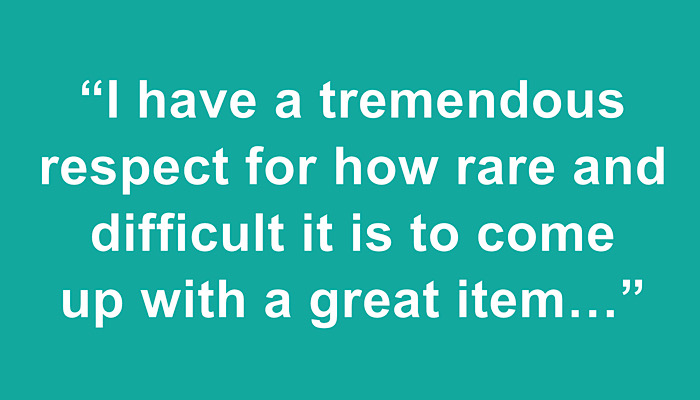
I can sense your excitement…
There’s nothing more exciting than when you see a great item! When you come across that rare bird; that blend of novelty and magic mixed with familiarity… It’s something worth championing. And any partner that played a role in getting there deserves to participate in whatever success might come from it.
Lovely! I’m also told you ask a lot of excellent ‘What if’ questions to inspire inventive thinking. But why is asking “What if…” useful, do you think? What makes those two words so powerful?
It’s a bit counter intuitive, but a lot of my job – and the job of all toy creatives – is somewhat the opposite of being ‘inventive’.
Oh? In what way?
It’s often about finding ways to make things feel less ‘new’… In other words, to make them feel more relatable and familiar. The invention itself – the thing which has never been done before – is often only half the challenge. The other half is developing the story, or idiom, or theme, or name, or marketing position… The context makes the invention easy to understand.
So let me just understand you, here… The invention itself can be brilliantly innovative and new, but that’s not the whole battle… There has to be a theme – or dressing, perhaps – that makes it feel relatable?
That’s exactly it. It’s about providing a context to take the abstract and turning it into the specific, in such a way that people can relate. I like to use the game Operation as an good example. The core invention is a very abstract electro-mechanical dexterity game requiring steady hands. It could easily have been completely un-themed, made of wires and batteries
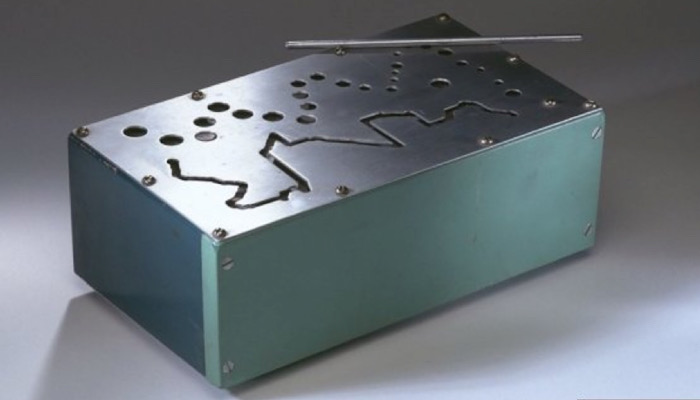
Indeed, it was, wasn’t it? The original prototype? It’s a big ugly box!
Right. And it could’ve been called “Steady Hands”. But someone had the good idea to wrap the theme of an operation around it, and that turned it into a story. Not a story in the narrative sense per se, but a context where the actions and gameplay now have a broader, relatable reason for being. It brings character and roleplay into it.
That’s a fantastic example! You get the idea of the game in an instant…
The entire experience goes from being abstract and arbitrary to fun and familiar. That’s how people connect with things, by relating them to things with which they have familiarity… Through stories. And so a lot of my job is meeting inventors half way with prompts to refine and transform somewhat more abstract inventions into more relatable products with a story.
That’s absolutely great. What a great example. And in regard to your own vision about which inventions have mass-market appeal, Ben, how much is due to your own gut instinct? And how much is due to your long experience, do you think?
We all have a strong gut instinct… The question is how right is it? In my case, I try very hard to put myself in the shoes of someone who has no familiarity with a product at hand, and imagine “Would I understand this in two seconds?”.
Two?
Two! That’s a big part of it. Do I get this? The second question is, do I care? Then of course, there are all the questions of, “Is it magic?”; “Is it worth the price.”; “Is it sufficiently novel?”… After a while, all those questions become someone instinctive, and part of your gut reaction. After many years of experience, I think you really start to benefit from pattern recognition. You can quickly position opportunities comparatively and categorically, and within a historical context.

You also start to develop a sense of which stories are universal… Something of a sense of relative hierarchy within the zeitgeist. That helps a lot. But it can also bog you down too, getting mired in your own categorical thinking. For that reason, it’s great to surround yourself with other opinions. It never ceases to amaze me how differently people can see things.
Fantastic. I must say, Ben, I think some of the things you said here should be required reading for new inventors. This is like a masterclass!
You know, on that topic… We’ve actually created university classes on Toy inventing. We have them in four schools around the world now, with more on the way. If any of your readers are interested, I’d encourage them to check them out.
Brilliant. Great idea… We’ll put a link in to the UK one here. So, let’s move on… After around 20 years in the industry, you were given an IDIOT Award at the UK Inventors Dinner. For context, Ben, how is that award regarded in the industry?
For anyone who works with inventors, I think it is a very prestigious award and a great honour.
In terms of your winning it, why do you think it came to you? How did you feel?
I don’t know why it came to me, but I was very touched to be honoured in such great company! It was a great honour, and a great night. I’ve always loved the UK Inventors Dinner. There’s a spirit and community to that event that’s unlike anything else in the industry, so it was very special to me.
Out of interest, do you remember what you said when accepting it? Or whom you thanked?
I don’t recall the specifics of my acceptance speech, but I almost certainly thanked all my good friends in the UK, and of course Benny: Ben Varadi – my boss, friend and mentor. He flew in to present the award, so I was doubly touched.

What else can you tell us about winning the IDIOT Award that people might not know?
You get a little trophy and a medallion, and every year all the past winners wear their medallions to the dinner. So you never want to forget your medallion. A trick I learned was to always keep it in your suitcase, that way you’ll never forget to bring it when you fly to the UK. Yet somehow, this year, after three years away from the dinner due to the pandemic, when I went to pack my bags, it wasn’t there!
Oh, good LORD! I don’t like this story!
You can imagine! I had no idea how, but it was gone. I searched high and low… Vanished. I was in a panic. The dinner was three days away, and I’d feel like I was being very disrespectful if I showed up without my medallion. I racked my brain… Maybe I could counterfeit it! So I got Benny to send me a photograph of his IDIOT Award, and then asked my colleague Paulie to mock up a version for me in cardboard… A fake second medallion!
Right…
It looked good enough to pass for the real thing in low lighting – so I was good to go. No one would be the wiser… Or so I thought. Then as I’m packing to go, and I’m choosing my suit jacket to bring on my trip, I pull out my black velvet tux jacket, and low and behold, there was the real medallion! It was in a small plastic bag, placed on a coat hanger by my dry cleaner, three years ago.
Because no one’s been out for three years!
Right! So I’d evidently broken the cardinal rule and forgotten to return it to my suitcase. It was a good thing I found it… I hadn’t accounted for scale when referencing the photo, and my dummy IDIOT Award turned out to be about half the size of the real thing.
You know, I’m really relieved you found that – but part of me wishes you’d rocked up and got busted within five seconds flat! Great story; thank you. We need to wrap it up, Ben, but let me ask you one final question… What’s the most interesting object in your office or on your desk?
My office is full of vintage 1980’s toy and video game paraphernalia, so I have a lot of neat stuff: signed inventions, a Power Glove sealed in the original box from its developer, Darin Barri. I’d say the coolest thing is probably a 1984 Karate Champ arcade cabinet from Data East.
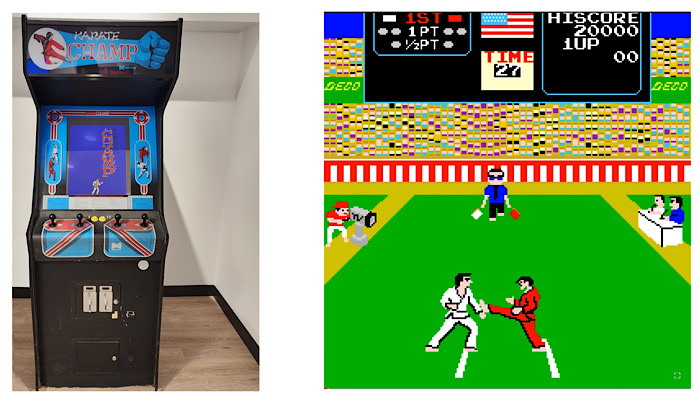
–
To stay in the loop with the latest news, interviews and features from the world of toy and game design, sign up to our weekly newsletter here








